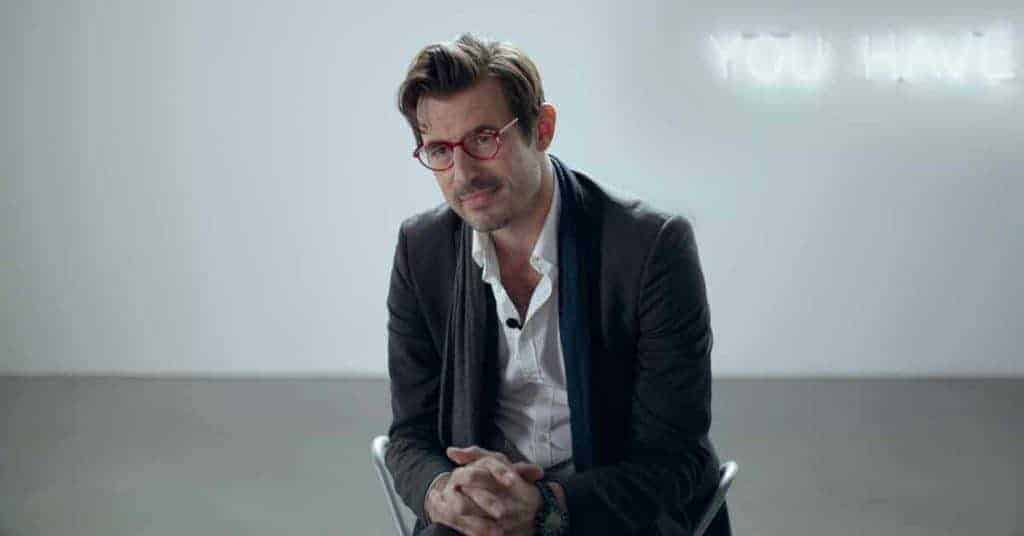Ruben Östlund discusses his Palme d’Or winner The Square, the mechanisms of empathy, the state of contemporary art, and the pleasures of tragi-comedy.

Swedish director Ruben Östlund’s Palme d’Or winning The Square is a biting yet humane critique of the hypocrisy of the upper middle-class. The film follows Christian (Claes Bang), a successful and charming art gallery curator who lives with a good conscience: although he’s a rich man who spends his days thinking about art, he drives an electric car and supports good causes. Yet no one is innocent under capitalism. When the consequences of one of his insensitive jokes puts him face to face with that uncomfortable truth, Christian is too proud and afraid to take responsibility for causing suffering.
Back in Toronto, the Seventh Row talked with Ruben Östlund on the phone about the true story behind the film’s genesis, approaching contemptible characters as human beings, the state of contemporary art, and the pleasures of the tragi-comedy.
The Seventh Row (7R): How did the idea for The Square begin?
Ruben Östlund: I was making a film called Play that was about really young boys robbing other young boys in the city where I lived. These robberies were kind of special because they took place in a mall where there were always a lot of people. There were lots of adults around while the robberies were taking place. It was a strange story, in that the adults almost never interacted with or helped the kids, and the kids almost never asked for help either.
I talked to my father about this, and he told me that in the 1950s, where he was growing up, his parents would put a tag around his neck with his address on it, and let him go by himself in central Stockholm. He was only 6 years old! At that time, you looked to other adults as people helping the children stay out of trouble. People had a responsibility towards all children in society. But today, we’re practically raising our kids to think of other adults as potential threats to them.
This change of attitude change has happened even though society has not become more dangerous. It’s just paranoia, a fear of each other. We just don’t trust each other anymore.
In this context, me and a friend of mine decided to create a symbolic place where we would be reminded of our common responsibility and reminded that we can trust each other. We created this symbolic square, in Värnamo, where the agreement is that if someone is standing in the square, passersbys have to help them. It gives an obligation, which breaks the bystander effect.
The symbolic square — the art instillation — actually came first. Then, I decided I wanted to make a film, because I thought that this idea touches on topics of our time.
[clickToTweet tweet=”‘I always ask the actor to relate to that set-up as a human being, not as a character.’ – Östlund” quote=”‘I always ask the actor to relate to that set-up as a human being, not as a character.’ – Östlund”]
7R: The Square is funny and emotional, but watching it also feels like solving an enigma. Every scene is about figuring out how it is possible for someone with no bad intentions to be so horrible. Did you write the script with this dynamic in mind?
Ruben Östlund: I always have a very clear set-up in all of my scenes. I always ask the actor to relate to that set-up as a human being, not as a character. If you relate to it as a human being, then you can use your own experience to imagine what can lead the character to do those things — even if the character is doing really stupid things. If the set-up is right, you can tell yourself, “Oh, I actually could do that, too, if I was in this situation.” That’s what I’m aiming for all the time.
7R: The movie is about the hypocrisy of rich people, and it would be very easy to make a glib film about this. But in The Square, Christian (Claes Bang) always remains humane and understandable. Was it important for you not to make the film too abstract and cynical?
Ruben Östlund: Yes. I think it’s very important to have an understanding for what the characters are doing. If you have a character that you want to judge and say, “He’s doing the wrong thing,” “He’s stupid,” “He’s a psychopath”, or whatever, then it becomes less interesting.
I think it’s much more interesting to have someone do something stupid or amoral out of pure candour or naivety. Because then you have to reflect and look back on yourself. Claes Bang is also a very sensitive guy, and he added a lot of sympathy to this character, in the way that he approached the role. He understood him, and he was not judging him.
[clickToTweet tweet=”‘I wanted to make a tragi-comedy where, at a certain point, you don’t know if you’re allowed to laugh anymore.'” quote=”I wanted to make a tragi-comedy, or a comic tragedy, where at a certain point, you don’t know if you’re allowed to laugh anymore.”]
7R: As The Square progresses, the humour of the film gradually dissipates, yet the film doesn’t become a black comedy: it stops making fun of how badly this man handles the situation. The film is ultimately very sincere.
Ruben Östlund: I wanted to make a tragi-comedy, or a comic tragedy, where at a certain point, you don’t know if you’re allowed to laugh anymore. It’s really nice when the viewers can’t be 100% sure where we take them. They have to accept that they don’t know, and we take them to unexpected places. Just like in real life, when you have something really comical happening, and there’s something really tragic attached to it. And when something really tragic has happened, there’s often something trivial and comic about it.
7R: The Square is also about the hypocrisy of people in the art community. Do you think there’s the same hypocrisy in filmmaking?
Ruben Östlund: It’s comparable, but I think there’s something about contemporary art that really needs to be criticised. I think that the people in that industry have lost themselves. They are very conventional in how they perceive art.
When you go to contemporary art galleries, you see pretty much the same things:here’s a Warhol, a Giacometti…. It’s a collection that has an economic value. Only after assessing that economic value, do they then discuss the way the art reflects on society, human beings, etc… There’s something very artificial about contemporary art today, I think.
[clickToTweet tweet=”‘When something really tragic has happened, there’s often something trivial and comic about it.’ ” quote=”‘When something really tragic has happened, there’s often something trivial and comic about it.’ “]
7R: This film is also the first time you worked with an American actor: Elisabeth Moss. What was that like?
Ruben Östlund: It was really fun! She’s a really great actor. It’s funny, because I think her character is probably the most absurd one in the movie — the one that is the most twisted. And she was fascinated about this character. She has a very curious and open mind, and a very interesting way to think about the set-up of a scene.
For example, the condom scene: when she’s walking out of the room, she’s running away almost mischievously, on her tip toes. That was such an intelligent way of turning over the scene once again. At first, when she’s holding the condom, Christian thinks she’s going to do something with it. But he’s just paranoid. When she starts walking away with it, you realise that he might have been right: it really looks like she was going to do something with the semen! Coming up with little touches like that is very much Elisabeth Moss’ skill.
[clickToTweet tweet=”Elisabeth Moss ‘has a very curious and open mind, and a very interesting way to think about the set-up of a scene.'” quote=”Elisabeth Moss ‘has a very curious and open mind, and a very interesting way to think about the set-up of a scene.'”]
7R: Do you work closely with your actors and let them improvise?
Ruben Östlund: Yes. What I’m trying to do is improvise around a clear set-up. I try to tell them what they should do, what we are looking for. But the actors sometimes can take some risks, and what they suggest can sometimes be too much. But sometimes, I say, “Well, that was fantastic. We’ll use it.” We can try out things for the scene. And then we go over the script over and over again. And at the end of the day, I say “OK, fine. I am really tired. Next!”
https://seventh-row.com/2017/09/23/lucrecia-martel-zama/

